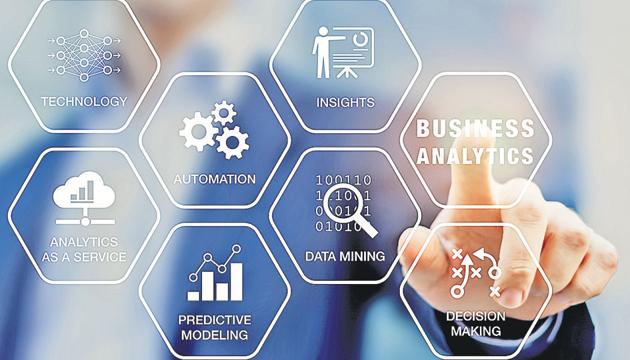| 15 June 2019 | Hindustan Times | Startup Saturday: The maths major that changed the game for AI |
In late 2015, with an investment of Rs 10 lakh, Pant set up his own venture, AlgoAnalytics

For Aniruddha Pant the romance with technology lasted just long enough to see the opportunity behind it.
“Everyone was happy with the efficiencies of smart phones, e-commerce, digitisation, but I realised that this was not enough. Simply because there was a lot more that technology could do for enterprises,” he says.
Perhaps his PhD in Applied Mathematics from University of California, Berkeley, and a decade-long stint at companies like TCS and Persistent made him view digitisation differently.
Says he “With technology, the ecosystem was getting complex. There is a humungous amount of data being generated and if used sensibly, it could make companies operate in a more intelligent way. With my mathematical background it was obvious to me to leverage the data being generated on account of technology.”
In late 2015, with an investment of Rs 10 lakh, Pant set up his own venture, AlgoAnalytics.
Fintech
Seemed like the market too was aligned to Aniruddha’s thinking.
“I hired four people and we worked on some concepts. Since ours was meant to be a service and not a product. We had to have a client’s brief to work on,” he explains.
His experience with several financial brokerages and institutions came in handy. In a short span of time Pant had lined up brokerage houses from Mumbai who saw value in business intelligence.
“I offered them a way to manage their clientele, to be able to predict which client would move out of that brokerage house, what are the offerings that would keep him with the company and so on,” he says.
While some would attribute this early success to luck, the truth was that businesses realised the need for data analytics that could give them an edge in the markets they operated.
Later, AlgoAnalytics solved similar problems for banks as well as insurance companies.
Autotech
Besides the financial industry, the low hanging fruit for Pune was the auto sector. However, the issues there were different. “One of the solutions I thought of was to offer machine intelligence in the sense that companies could reduce their downtime by being able to predict when a particular machine would fail. This would mean that they could take corrective action just in time to prevent a breakdown, that in turn would impact their production and further their delivery schedules,” says Pant.
Working with machines meant the machine had to be digital.
“The pressing machine, or lathe, must have a digital component that would be able to count the number of strokes or cutting, day in and day out. And only after capturing this data can we base our prediction model. Unfortunately most machines in the manufacturing industry are legacy machines that cannot capture any data. In fact this is a global issue, about 70 per cent of machines are legacy machines worldwide,” says Pant, adding “Of course there are IoT companies that are capturing data and storing it on a cloud; but without mathematical abilities it is not possible to mine that data and make sense out of it.”
In addition to the problem that there was no system to capture data on legacy machines, wasn’t there the issue of no proof of concept?
Says Pant, “Yes, though we do have a product to be validated, there were many questions in the minds of our customers regarding the credibility of what we were offering. Luckily for me, my wife Kanchan runs a manufacturing unit and we ran some tests on her machines. With the success of running our programs on her machines we were better able to market it to others.”
Pant now has three auto manufacturing companies as his clients. He cannot name them as he does not have their permission to do so.
Medtech
In 2016 Aniruddha was admitted to hospital. “I had two specialists treating me and as is the case, generally, both were not aware of the medication and treatment other was prescribing. As a result there was confusion,” says Pant.
This again led him to think of how data analytics could help hospitals. “Using data and algorithms it is possible for doctors of any specialty to know how their prescriptions are reacting with the other specialists’ medicines. This can save complications, lives and make treatment smooth and easy,” says Pant.
He offered this to the hospital where he was treated. And they bought into the concept. Again there was the PoC issue. For this Aniruddha devised a strategy. “Since we cannot make a one-size-fits-all kind of a solution, given that we have to depend on the data that is generated for a particular industry, we work with their data for some time till we can develop solutions. After we are ready with our offering, we give it to them for free for a month or so or at a reduced rate for six months.” This way both parties are happy.
AI, deep learning and the future view
The main marketing challenge is to make potential clients aware of the power as well as shortcomings of machine learning. “People tend to be on one of the extreme end. They either believe AI can do everything and soon humans will be replaced completely, or they believe it is practically useless. Also, getting sales people who can work on selling AI solutions is very difficult. This field being new needs understanding of domain, business feasibility all combined to be a convincing sales pitch.”
As of now AlgoAnalytics has customers in India, Japan and USA and aim to get more. “I want to be a one-stop shop for all AI for India and then globally for advanced AI and machine learning work. I hope to have offices in Singapore, Japan and Europe.”

